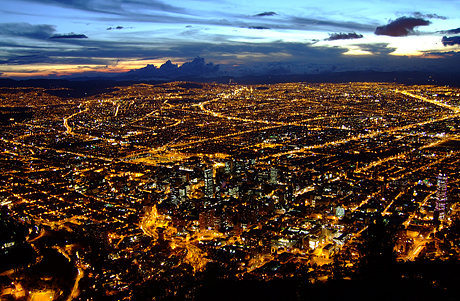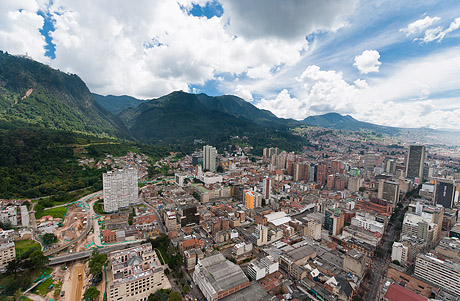Digital Media Latinoamérica 2013
Status
Visual

Title
Date and Location
-
30 Oct 2013 - 31 Oct 2013BogotáColombia
Information
-
Visitor Information
Bogotá, Colombia, will host WAN-IFRA's first DML Conference on 30 and 31 October 2013. Join us and discover its attractions, opportunities and the country's robust press industry!
 Bogotá, one of Latin America's most dynamic capitals
Bogotá, one of Latin America's most dynamic capitalsHome to more than 7 million people, with more than 70 museums, 45 theatres and a unique inter-linked network of public libraries, Bogotá is one of Latin America's most culturally dynamic cities. A major regional hub since the restoration of its 'El Dorado' airport, Bogotá offers its visitors an array of restaurants and shopping centers, and with more than 390 bars and night-clubs, is home to one of the continent’s most vibrant nightlives.
Colombia can boast one of the most dynamic and stable economies of Latin America. With an average GDP annual growth of 4.8% from 2003 to 2011, it stands better than prosperous Chile and regional powerhouse Brazil (4.5% and 4% respectively for the same period).
In this context, Colombian newspaper executives are increasingly facing the disruption of the industry’s tradition business model, as a result of growing digital media channels and fast-paced changes in consumer habits. But the opportunities for business development in digital media are huge: Colombia has the fastest growing internet access spending, both wired and mobile, of the region, with an estimated compound annual increase of 20.2% from 2012 to 2016, reaching $5.6 billion (third in the region after Brazil and Mexico). With 55.9% of Internet penetration, it is South America’s fourth most connected country, behind Argentina, but in front of Brazil, Peru or Venezuela.
The Colombian press has led the way towards innovation and change in the region. In 2007, the widest-circulation newspaper in the country, El Tiempo embraced change and made the first move towards the futurethrough one of the most ambitious integration projects in the world at the time. After years of severe difficulties that reduced it to a weekly publishing cycle, El Espectador bounced back to become a robust daily, in part as a result of creative award-winning marketing campaigns. In 2009, Colombian news website La Silla Vacía was amongst the first exclusively digital platforms to successfully propose a new type of investigative journalism based on quality reporting, online tools, social media and infographics. Today, more than 20 similar websites have flourished in the region, leading many to describe it as the “boom” of Latin American digital journalism.
 Colombia, home to one the region's most vibrant press industries
Colombia, home to one the region's most vibrant press industriesIn the 1970’s and 1980’s, with the rise in violence from guerilla groups, paramilitary forces and organised crime, the press frequently denounced abuses and corruption and became the target of violent attacks. In 1986, the editor of El Espectador, Guillermo Cano, was shot to death in front of his office. In 1989, the newspaper premises were destroyed by a bomb blast. In recognition of his courage in these terribly challenging times, the World Association of Newspapers awarded Luis Gabriel Cano, brother of Guillermo, with the Golden Pen of Freedom in 1990. Today, challenges to guaranteeing journalists’ safety remain, notably in the provinces, but the levels of violence have considerably decreased.
Known to produce some of Latin America’s best journalists, it is not a coincidence if the Colombian press has been at the heart of the promotion of Colombian literature, which has been one of the richest of the world. Nobel Prize in Literature laureate Gabriel García Márquez started his career as a journalist in regional newspaper El Universal of Cartagena, moving then to El Heraldo of Barranquilla and finally to national daily El Espectador, before founding his own publication, Alternativa. In 1994, he created his foundation, Fundación Nuevo Periodismo Iberoamericano, which has become one of the region's most respected journalism institutions and trains Latin America’s best journalists.
Navigation
Contact information

Raquel Gonzalez Benitez
Sales - Event Manager
WAN-IFRA
- +5411562280626
| Madrid,
Spain
Phone: +34647676662
E-Mail: raquel.gonzalez@wan-ifra.org
Author information

Rodrigo Bonilla
Director, Americas / Director, Américas
WAN-IFRA
| Mexico City,
Mexico
Phone: +52 55 4172 1212
E-Mail: rodrigo.bonilla@wan-ifra.org








